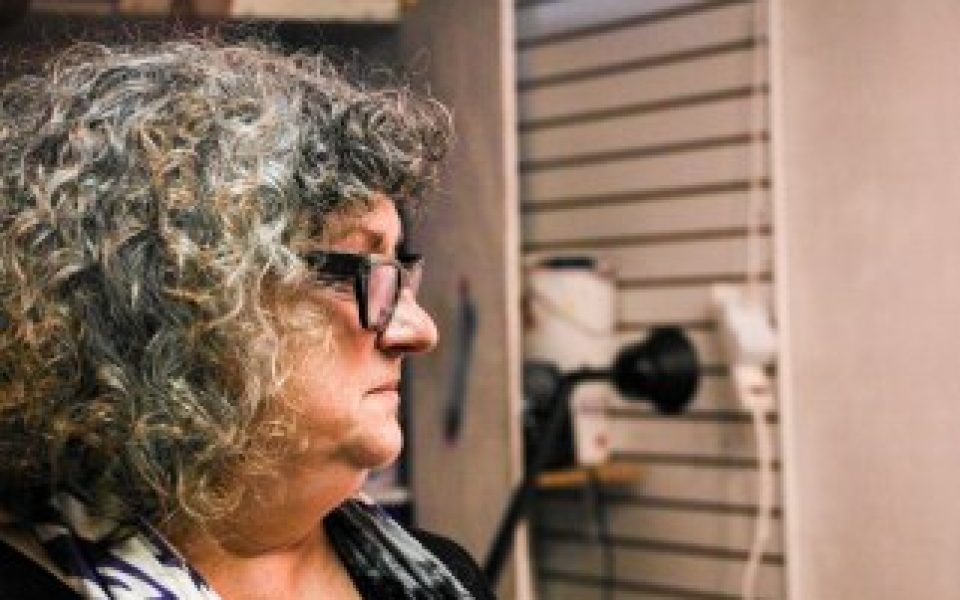At the end of the year Marianne DiNapoli-Mylet will leave her Trade Street studio, where she’s worked since 1999. (Daniel Wirtheim)
by Daniel Wirtheim
Back in 1999, when Winston-Salem mural painter Marianne DiNapoli-Mylet co-founded Studios@625 on Trade Street, the arts district was a far cry from what it is today.
DiNapoli-Mylet describes rats scurrying down the street and empty beer cans crammed into gutters. There were no gallery hops and nowhere to find a decent meal. Not many people wanted to go to Trade Street but DiNapoli-Mylet and her fellow artists didn’t mind, and in fact thrived there. And the Trade Street art galleries flourished along with the city’s growth, making some artists feel nostalgic for the gritty street that had inspired them. So DiNapoli-Mylet decided that at the end of 2015 she is leaving Trade Street.
“I went to go do a mural the other day and couldn’t find a parking place because there were beer trucks there,” DiNapoli-Mylet said. “The rents have been slowly creeping up and that’s another factor.”
Studios@625 is a working studio where artists can rent spaces to work. Before Trade Street’s renovation, no one sold much art. For galleries that was a bad thing, but for Mylet and her fellow artists, Trade Street was a safe haven for the city’s offbeat residents.
“There were less of us and we all hung out together,” DiNapoli-Mylet. “It was a lot easier for me to get in and out of the space. The rents were lower and there was just this cool bohemian atmosphere.”
DiNapoli-Mylet is known for her murals illustrating the history of spaces in Winston-Salem. She’s captured the history of the black press, featuring the image of Frederick Douglass on the side of the Chronicle offices, Winston-Salem’s black-owned weekly newspaper. Her first mural, “History of Tobacco,” documented the Tobacco Market, a carnival-like auction once held in the city. Her mural “Miller’s Department Store” shows what the Trade Street department store looked like in 1939. Another mural, “Now and Then on Trade,” shows the evolution of craftspeople and businesses on the commercial hub.
“[Now] there’s too much traffic; this studio has become a retail space,” DiNapoli-Mylet said. “Since the arts district has been the place to go there’s been a lot of people who come down here and close down the street. People from Krispy Kreme came down and did an event. The other day I tried to do some work and the Texas Pete Festival was downtown. I couldn’t get in a two-block radius.”[pullquote]Marianne DiNapoli-Mylet’s new exhibit opens at Hubris Boutique, located at 631 N. Trade St. in Winston-Salem, on Friday at 7 p.m. [/pullquote]
In the last five years DiNapoli-Mylet has sold more art than she has in her entire tenure on Trade Street. But it’s a double-edged sword, she says, making it a less practical place to execute her trade. And the street has lost its more bohemian, edgy charm.
The first chain restaurant, Famous Toastery, opened last month on Trade Street. DiNapoli-Mylet has seen gentrification happen in Philadelphia, and feels that she knows how these things go.
“The galleries do well while studio artists suffer,” she said. “I think that just happens in cities. I don’t think there’s anything we can do to prevent it.”
DiNapoli-Mylet also has personal reasons for her move; she’s tired of being an administrator. It’s not her personality type, she says. Ed Koos, a member of Studio@625, will be moving into the role of manager. With her husband recently retired, DiNapoli-Mylet said this seems like an opportune moment to spend some time at their cabin in the mountains.
“There are still lots of artists [on Trade Street],” DiNapoli-Mylet said. “Plenty of people have spaces that work well down there.”
DiNapoli-Mylet has been an active member of the Downtown Arts District Association and thinks that the gallery hops are only going to get bigger and more lucrative. She’s had a positive experience partnering with fellow artists on Trade Street, but without the rats and empty beer cans, it’s not the kind of street for a mural painter.
“I’m really going to miss the people I’ve become close to,” DiNapoli-Mylet said. “It’s more that I think it’s time to sort of focus on my own work.”
Join the First Amendment Society, a membership that goes directly to funding TCB‘s newsroom.
We believe that reporting can save the world.
The TCB First Amendment Society recognizes the vital role of a free, unfettered press with a bundling of local experiences designed to build community, and unique engagements with our newsroom that will help you understand, and shape, local journalism’s critical role in uplifting the people in our cities.
All revenue goes directly into the newsroom as reporters’ salaries and freelance commissions.


Leave a Reply